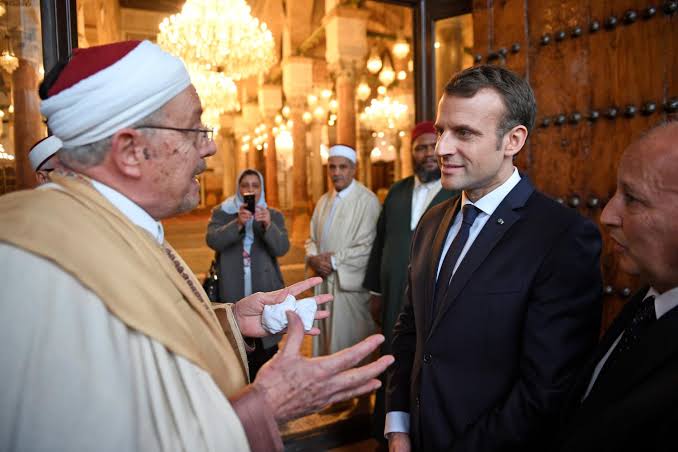France faces rising Islamist influence warns top intelligence official

By Vijaya Laxmi Tripura
In a recent interview with Le Monde, Bertrand Chamoulaud, head of France’s National Directorate for Territorial Intelligence, raised serious concerns about the growing influence of the Muslim Brotherhood in France.
According to Chamoulaud, the Islamist organization aims to incorporate France into a caliphate governed by Sharia law. These remarks underscore the organization’s subtle yet systematic approach to expanding its foothold in French society, leveraging societal tensions to further its agenda.
Chamoulaud highlighted the presence of over 100,000 worshippers attending mosques affiliated with the Muslim Brotherhood. These mosques, he asserted, serve as platforms for spreading the group’s ideology.
However, unlike groups that resort to overt violence, the Brotherhood employs a “very smooth” discourse, allowing it to avoid immediate detection and condemnation.
The organization’s strategy involves a calculated infiltration of various sectors of French society, including sports, health, and education. Chamoulaud warned that this approach aims to normalize Islamist ideologies, making them appear benign and even appealing to certain segments of the population.
“This concerns us because their infiltration affects all sectors,” he said, emphasizing the pervasive nature of the threat.
A significant aspect of the Muslim Brotherhood’s strategy, according to Chamoulaud, involves portraying itself as a victim of state oppression.
This narrative is deployed whenever mosques are closed or separatist imams are expelled, with Islamists accusing the government of Islamophobia. Such claims resonate with moderate Muslims, potentially drawing them into the organization’s fold.
Chamoulaud pointed to the now-dissolved Collective Against Islamophobia in France (CCIF) as an example of this tactic. Founded in 2003 to combat discrimination against Muslims, the CCIF was frequently criticized for its use of the term “Islamophobia” and suspected of Islamist ties.
Despite its dissolution in 2020, the CCIF’s ideas, including the promotion of compulsory veiling and the rejection of mixed-race groups, are reportedly gaining traction in neighboring countries like Belgium.
Founded in Egypt in 1928 by Islamic scholar Hassan al-Banna, the Muslim Brotherhood is a transnational Sunni Islamist organization advocating for the application of Islamic law across all aspects of society.
Over the decades, it has faced bans and designations as a terrorist organization in several countries due to its controversial methods and objectives.
In France, the Brotherhood’s expansion coincides with a broader increase in the Muslim population, now estimated at nearly seven million, or about 10% of the country’s total population.
Islam has become the second-largest religion in France after Catholicism, further highlighting the challenges of integrating diverse communities in a secular republic.
President Emmanuel Macron’s administration has implemented stringent measures to counter Islamist separatism and radical Islam. These efforts gained momentum following a series of deadly jihadist attacks by both foreign and homegrown militants in recent years.
Macron’s initiatives aim to limit foreign influence over Muslim institutions and promote a French Islam aligned with the country’s secular values.One of the most notable measures includes the closure of mosques suspected of promoting extremist ideologies.
The government has also expelled foreign imams deemed separatist and increased oversight of Islamic schools and associations. These actions, however, have drawn criticism from some quarters, with accusations of stigmatizing Muslims and infringing on religious freedoms.
Chamoulaud’s remarks also shed light on the Muslim Brotherhood’s growing influence in other European countries. The infiltration of civil society organizations and the promotion of divisive ideologies are not confined to France.
Belgium, for instance, is witnessing the gradual establishment of ideas propagated by the CCIF. This cross-border spread underscores the transnational nature of the Brotherhood’s operations, requiring a coordinated European response.
The Brotherhood’s strategy of exploiting societal tensions is particularly concerning. By positioning itself as a defender of Muslim rights and a victim of systemic discrimination, the organization gains sympathy and recruits followers.
This approach complicates government efforts to counter radicalism, as it blurs the line between legitimate grievances and extremist propaganda.
For instance, debates over the wearing of veils and other Islamic symbols in public spaces have often polarized French society. The Brotherhood’s narrative capitalizes on such divisions, framing government policies as attacks on Islam rather than measures to uphold secularism.
This not only fuels resentment among Muslims but also hampers the integration of diverse communities.
The challenge for France lies in striking a balance between ensuring national security and fostering social cohesion. While measures to counter Islamist separatism are essential, they must be implemented in a way that does not alienate moderate Muslims.
Failure to do so risks driving a wedge between communities, creating fertile ground for radical ideologies to take root.
Chamoulaud’s warnings serve as a stark reminder of the complexities involved in addressing Islamist influence. The Brotherhood’s non-violent yet subversive methods require a nuanced response that goes beyond traditional counterterrorism strategies.
This includes promoting inclusive policies that address legitimate grievances while unequivocally rejecting extremist ideologies.
The Muslim Brotherhood’s activities in France are indicative of a larger trend across Europe, where Islamist organizations exploit democratic freedoms to advance their agendas.
This raises questions about the resilience of liberal democracies in the face of ideologies that seek to undermine them from within.European governments must recognize the transnational nature of this challenge and collaborate to address it effectively.
This includes sharing intelligence, coordinating policies, and fostering dialogue with moderate Muslim leaders to counteract extremist narratives.
The revelations by Bertrand Chamoulaud underscore the urgent need for vigilance against Islamist infiltration in France and beyond.
While the Muslim Brotherhood’s methods may be subtle, their long-term objectives pose a significant threat to the secular and democratic values of European societies.
Addressing this challenge requires a comprehensive approach that combines robust security measures with efforts to promote integration and social cohesion.
Only through such a balanced strategy can France and its European neighbours safeguard their values and ensure a harmonious coexistence among diverse communities.




